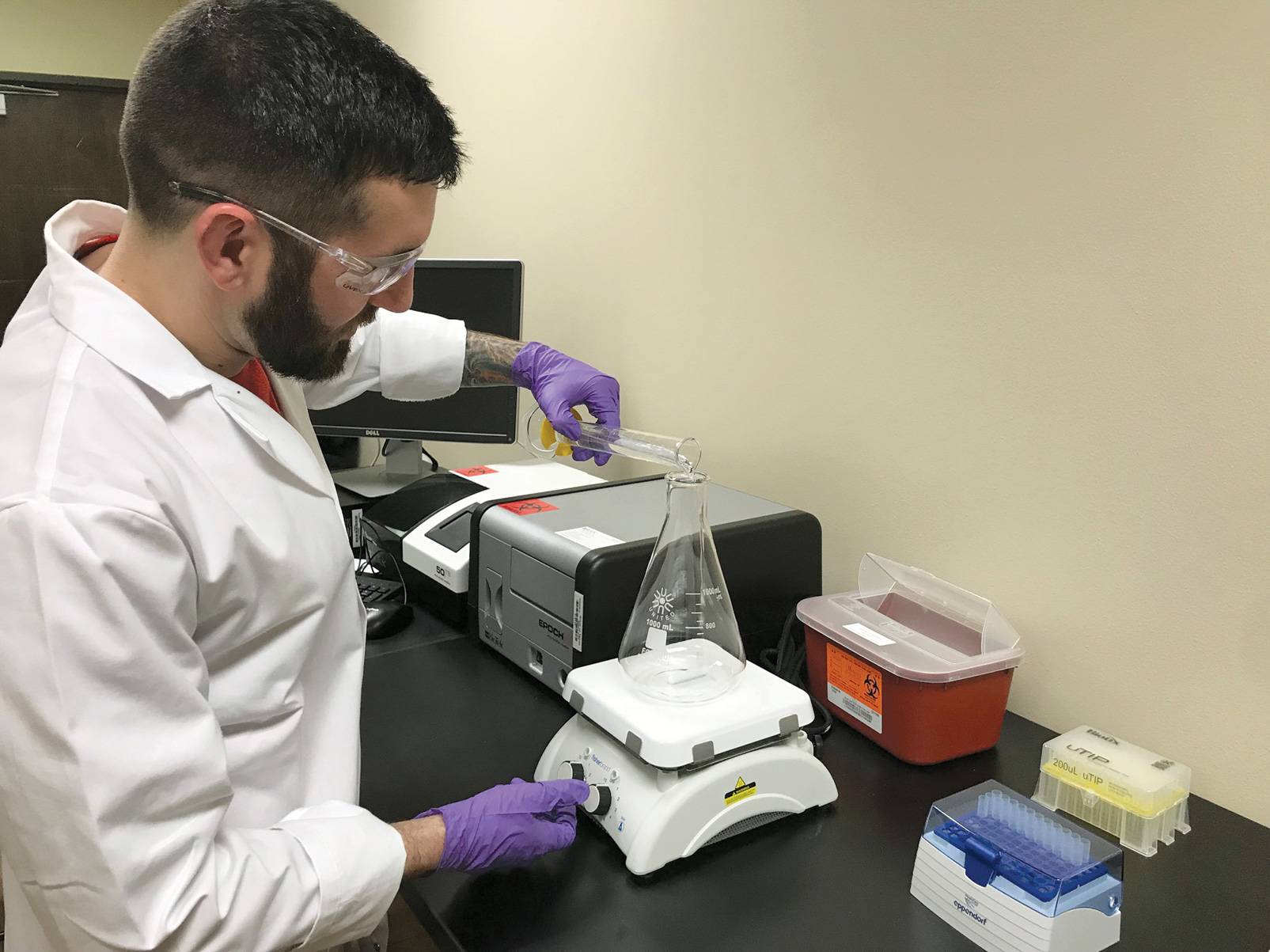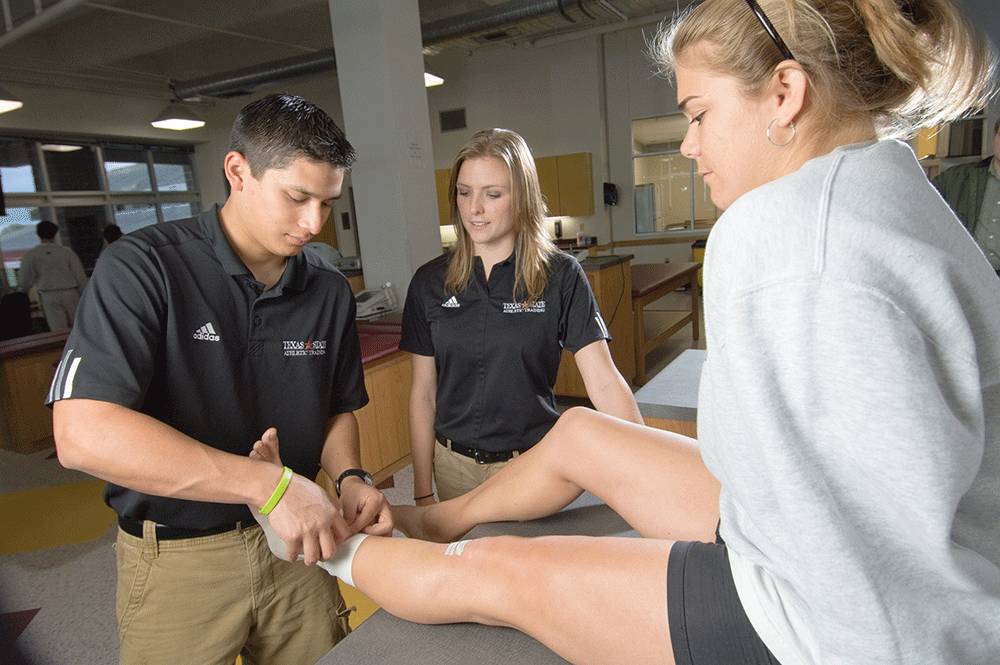Exercise Science (M.S.)
M.S. Exercise Science

Program Overview
Members of the graduate faculty are nationally known for their research, teaching and service within the profession. Faculty devote time to student-centered learning in classrooms, laboratories and community settings. Facilities include neuromuscular physiology, cardiovascular physiology, exercise physiology, metabolic and applied physiology, biomechanics/sports medicine, and community-engaged scholarship laboratories.
Course Work
Graduate studies in exercise science and physical education will equip students with knowledge, skills and abilities necessary to address health issues related to physical inactivity and obesity and to enhance human performance using evidence-based principles. Graduates will gain the critical thinking, research and technical skills to understand research-based literature and use innovative approaches to problem solving and gain the competencies to successfully work with children, adolescents, adults and seniors. Students can choose from the thesis or non-thesis options in both exercise science and its concentrations.
| Degree | Concentration | Hours | Thesis Option | Minor Option | Location |
|---|---|---|---|---|---|
Degree M.S. | Concentration No concentration | Hours 36 | Thesis Option Non-Thesis | Minor Option No minor | Location San Marcos |
Degree M.S. | Concentration No concentration | Hours 36 | Thesis Option Thesis | Minor Option No minor | Location San Marcos |
Degree M.S. | Concentration Health and Rehabilitation Sciences | Hours 36 | Thesis Option Non-Thesis | Minor Option No minor | Location San Marcos |
Degree M.S. | Concentration Health and Rehabilitation Sciences | Hours 36 | Thesis Option Thesis | Minor Option No minor | Location San Marcos |
Degree M.S. | Concentration Strength & Conditioning and Sport Coaching | Hours 36 | Thesis Option Non-Thesis | Minor Option No minor | Location San Marcos |
Degree M.S. | Concentration Strength & Conditioning and Sport Coaching | Hours 36 | Thesis Option Thesis | Minor Option No minor | Location San Marcos |
Degree M.S. | Concentration Sport Coaching (Accelerated Online) | Hours 36 | Thesis Option Non-Thesis | Minor Option No minor | Location Online |
Online Availability
The Sport Coaching concentration is completely online. If you are not a Texas resident and will not relocate, please visit the Office of Distance and Extended Learning. International applicants will not be eligible to receive a Form I-20 or DS-2019 for an F-1 or J-1 visa from Texas State and may review the eligibility requirements of enrolling in online programs and contact the International Student and Scholar Services (ISSS) with questions.
Program Details
Graduates are successful in obtaining employment in clinical, educational, fitness and sport settings. Many graduates sit for advanced professional certifications, and some choose to pursue doctoral studies.
Program Mission
The mission of the Department of Health and Human Performance is to create and disseminate knowledge promoting evidence-based practice in health promotion, public health, exercise science and recreation professions. The department aims to be a national leader in promoting human performance and health-related quality of life for all.
The mission of the exercise and sports science program is to nurture students into lifelong learners through effective and innovative teaching, research and service. The program also aims to cultivate graduates into models of healthy behaviors that advance the profession.
Career Options
Graduates will be in demand and able to work in all sectors of the workforce, including federal, state and local government health agencies, public schools and universities. Positions include rehabilitation specialists, clinical exercise physiologists, strength, conditioning, and sport coaches, directors of fitness and wellness programs, and physical education teachers.
Program Faculty
The exercise and sports science faculty specialize in several academic disciplines within kinesiology, the scientific study of human movement. Faculty conduct research in state-of-the-art laboratories for neuromuscular and exercise physiology, biomechanics and sport medicine, as well as in community and school settings. Collectively the faculty examine critical issues related to both the physiological, psychological, and cognitive components and variables that influence participation in physical activity and sports, and they apply behavior therapy for individuals with disabilities.
Contact us for general questions about your application, funding opportunities, and more. If you have specific questions after reviewing the program details, contact the program's graduate advisor.
Graduate Advisor
Dr. Joni Mettler
jam388@txstate.edu
512.245.9691
Jowers Center (JOW), Room A174

Apply Now Already know that Texas State is right for you?
Application Deadlines
Non-Accelerated Program
| Deadlines | U.S. Citizen | International |
|---|---|---|
Deadlines Fall - Priority | U.S. Citizen February 1 | International February 1 |
Deadlines Fall - Standard | U.S. Citizen June 15 (*Flexible) | International June 1 |
Deadlines Spring | U.S. Citizen October 10 (*Flexible) | International October 1 |
Deadlines Summer I | U.S. Citizen April 15 (*Flexible) | International March 15 |
*This program’s deadline is flexible for those not requiring an F/J visa. A flexible deadline means applications received after the standard deadline may be reviewed on a first-come, first-served basis with no guarantees for admission consideration.
|
|
Funding Information Applications must be complete by the priority deadline to be considered for certain types of funding. |
|
|
Decision Timeline This program reviews applications on a rolling basis. |
Accelerated Online Program
| Term | Part of Term | Deadline | Start Date |
|---|---|---|---|
| Fall | First 8 Weeks | August 15 | August 25 |
| Fall | Second 8 Weeks | September 30 | October 14 |
| Spring | First 8 Weeks | TBD | TBD |
| Spring | Second 8 Weeks | TBD | TBD |
| Summer | First 5 Weeks | May 13 | May 27 |
| Summer | Second 5 Weeks | June 16 | June 30 |
Admission Requirements
The items required for admission consideration are listed below. Additional information for applicants with international credentials can be found on our international web pages.
-
Application
- Completed online application
Review important information about the online application.
-
Application Fee
- $55 nonrefundable application fee
OR - $90 nonrefundable application fee for applications with international credentials
Review important information about application fees.
- $55 nonrefundable application fee
-
Transcripts & GPA
- baccalaureate degree from a regionally accredited university (Non-U.S. degrees must be equivalent to a four-year U.S. Bachelor’s degree. In most cases, three-year degrees are not considered. Visit our International FAQs for more information.)
- a copy of an official transcript from each institution where course credit was granted
- a 2.75 overall GPA or a 2.75 GPA in your last 60 hours of undergraduate course work (plus any completed graduate courses)
- background course work:
- at least 9 hours of exercise science undergraduate credit hours. Students who do not have these hours may be required to complete leveling courses.
Review important information about transcripts. Official transcripts, sent directly from your institution, will be required if admission is granted.
-
Test Scores
GRE
- GRE not required
Approved English Proficiency Exam Scores
Applicants are required to submit an approved English proficiency exam score that meets the minimum program requirements below unless they have earned a bachelor’s degree or higher from a regionally accredited U.S. institution or the equivalent from a country on our exempt countries list.
- official TOEFL iBT scores required with a 78 overall
- official PTE scores required with a 52 overall
- official IELTS (academic) scores required with a 6.5 overall and
- minimum individual module scores of 6.0
- official Duolingo Scores required with a 110 overall
- official TOEFL Essentials scores required with an 8.5 overall
This program does not offer admission if the scores above are not met.
-
Documents
- resume/CV
- statement of purpose (approximately 500 words, typed and double-spaced) addressing the following:
- professional goals
- reasons for pursuing education and training in exercise science
- summary of major strengths and weaknesses with respect to being admitted into the program
- experiences and/or research interests that may contribute to the program
- three letters of recommendation (including at least two academic references from current or former professors) regarding professional and academic competence and character
Review important information about documents.